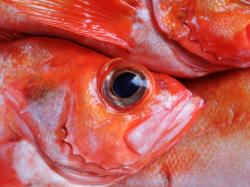US Acadian Redfish, Haddock & Pollock Otter Trawl Fishery Begins MSC Assessment Process
December 12, 2014 | 4 min to read

Seattle, WA — The U.S. Acadian redfish (Sebastes faciatus), haddock (Melanogrammus aeglefinus) and pollock (Pollachius virens) otter trawl fishery has voluntarily entered the Marine Stewardship Council’s (MSC) independent assessment process. If this fishery successfully achieves certification, products from the fishery would then be eligible to carry the MSC’s blue ecolabel.
The MSC fishery standard is the world’s most robust and credible standard for the certification of environmentally sustainable and well-managed wild-capture fisheries. The transparent assessment will examine the fishery’s impact on fish stocks and the marine ecosystem. It will also evaluate the fishery’s management process to ensure that it is taking all necessary steps to protect the ocean environment for future generations.
About the U.S. Acadian redfish, haddock and pollock fishery
This fishery is located in U.S. Atlantic exclusive economic zone (EEZ) waters in the Gulf of Maine and Georges Bank region, and covers all fish harvesters in the groundfish complex managed by the New England Fisheries Management Council (NEFMC) under the authority of NOAA’s National Marine Fisheries Service.
The client putting this fishery forward for assessment is Cape Ann Seafood Exchange Inc. (CASE), a seafood trading business located in Gloucester, Massachusetts. Through CASE, many licensed vessels fishing in the region connect with other companies that wish to source fish from the area. For other participants in the fishery who would like to join the certificate, CASE has expressed interest in discussing certificate sharing arrangements according to MSC requirements.
The majority of the catch from this fishery is sold fresh in New England through regional buyers and then onwards to local and distant markets in the United States.
MSC welcomes fishery to the MSC program
Jay Lugar, MSC Fisheries Outreach Manager for the Americas said, “We welcome Cape Ann Seafood Exchange’s decision to enter MSC assessment and wish them well during the process. This New England fishery has been delivering seafood to local communities, national and export markets for many generations and seafood markets would be pleased to have additional certified supplies of these iconic species.”
“The New England groundfish fishery is well managed and we look forward to achieving MSC certification which will help us demonstrate this management success and grow markets across the United States,” said Kristian Kristensen, President, of Cape Ann Seafood Exchange Inc. “Cape Ann Seafood Exchange is working with our local fishermen and seafood partners to help sustain the industry in our area by increasing awareness of these species. Groundfish built Gloucester and it is our hope that with MSC certification we will be better positioned to communicate our sustainability story to all.”
MSC's standard for sustainable fishing
The assessment will measure the fishery against MSC’s standard for sustainable fishing which was developed over the past 15 years in consultation with NGO’s, marine scientists, and industry experts.
The standard is based on three core principles:
- Maintaining healthy populations of target species;
- Maintaining the integrity, productivity and resilience of the wider marine ecosystem; and,
- Effective management.
The MSC’s Global Impacts Report 2014 and Annual Report 2013-14 show that fisheries engaged in the MSC certification program are delivering improvements to the marine environment. Since 1999, those achieving MSC certification have made 575 improvements to their fishing practices, including measures to reduce unwanted bycatch of endangered species, restore habitat and improve scientific understanding of marine ecosystems.
Have your say
Stakeholder input is crucial to the outcome of a fishery assessment and all results are peer reviewed. Anyone can be involved in the assessment process. If you would like to bring information to the attention of the certifier, SAI Global Assurance Services, please contact Orla Minogue at Orla.Minogue@saiglobal.com. The assessment is projected to take 11 months.
About the Marine Stewardship Council (MSC)
The Marine Stewardship Council (MSC) is an international non-profit organization set up to help transform the seafood market to a sustainable basis. The MSC runs the only certification and ecolabeling program for wild-capture fisheries consistent with the ISEAL Code of Good Practice for Setting Social and Environmental Standards and the United Nations Food and Agricultural Organization Guidelines for the Ecolabeling of Fish and Fishery Products from Marine Capture Fisheries. These guidelines are based upon the FAO Code of Conduct for Responsible Fishing and require that credible fishery certification and ecolabeling schemes include
· Objective, third-party fishery assessment utilizing scientific evidence;
· Transparent processes with built-in stakeholder consultation and objection procedures;
· Standards based on the sustainability of target species, ecosystems and management practices.
The MSC has regional or area offices in London, Seattle, Tokyo, Sydney, The Hague, Beijing, Berlin, Cape Town, Copenhagen, Halifax, Paris, Madrid, Stockholm, Santiago, Moscow, Salvador, Singapore and Reykjavik.
In total, over 330 fisheries are engaged in the MSC program with 246 certified and 89 under full assessment. Together, fisheries already certified or in full assessment record annual catches of close to ten million metric tonnes of seafood. This represents over eleven per cent of the annual global harvest of wild capture fisheries. Certified fisheries currently land over seven million metric tonnes of seafood annually – close to eight per cent of the total harvest from wild capture fisheries. Worldwide, more than 25,000 seafood products, which can be traced back to the certified sustainable fisheries, bear the blue MSC ecolabel.
For more information on the work of the MSC, please visit www.msc.org
Source: Marine Stewardship Council (MSC)
